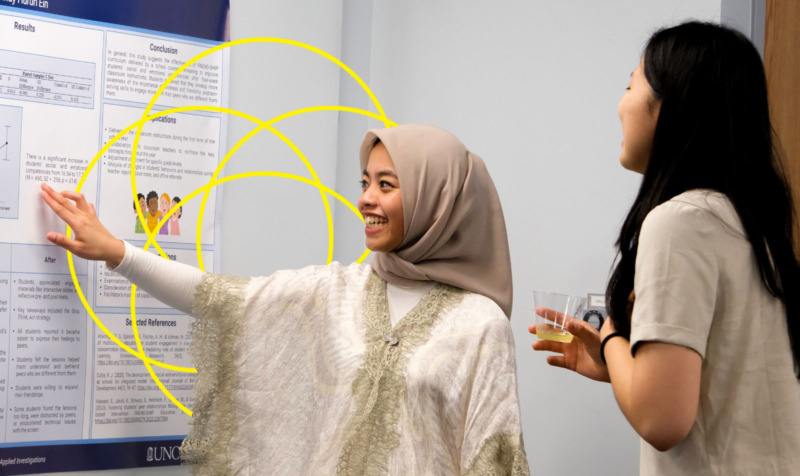#13 School Counseling Program in the U.S.
– U.S. News & World Report, 2025

Culturally Responsive Counseling
The Master of Education (M.Ed.) in School Counseling program at the UNC School of Education prepares culturally responsive school counselors who draw upon student and community strengths.
What do school counselors do?
School counselors work in elementary, middle, and high schools, as well as in district and supervisory roles. They support all students’ academic, career, and social-emotional development by designing, implementing, and evaluating comprehensive programs. Through leadership, collaboration, and a commitment to expanding opportunity, school counselors help ensure access to educational experiences for every student.
How do school counselors make a lasting impact, not just within the school, but on how students see themselves as learners?
School counselors work at both the micro and systems levels. On the micro level, they provide individual counseling, group counseling, professional development, and consultation. At the same time, they work at a systems level by thinking about school climate, a sense of belonging, and how students connect with their peers and with adults in the building, including teachers.
They also examine school policies, practices, and culture to understand how those factors influence whether students feel supported, valued, and like they belong. By addressing both individual needs and systemic issues, school counselors help shape how students view themselves within classrooms, clubs, and the broader school community.
This reflects a shift in the profession toward being more climate-focused, recognizing that supporting students means not only addressing individual challenges, but also improving the environments in which students are learning and growing.
Connecting Coursework to Practice
This accelerated 14-month program — combining rigorous coursework with a year of school-based fieldwork — equips students with the knowledge and skills to address a wide range of student needs by designing and implementing comprehensive school counseling programs that foster student success. Supported by a close-knit, collaborative cohort and experienced faculty, students apply classroom learning from the start, bringing theory to life in real-world settings.
The 60-credit curriculum integrates a human-centered approach with practical application, helping students develop their strengths and advocate for equitable conditions that support youth development. Students learn to design, implement, and evaluate comprehensive, culturally responsive school counseling programs aligned with the American School Counselor Association’s National Model. They also gain the tools to remove barriers to learning, promote development, and champion the needs of all students, especially our most vulnerable ones.
Career Readiness
Through expert mentorship and immersive fieldwork, students graduate prepared to guide academic, career, and social-emotional growth for every student they serve. The program leads to licensure as a K–12 school counselor in North Carolina, with reciprocity options in several other states. After two years of supervised experience, graduates are also eligible to apply for licensure as a Licensed Clinical Mental Health Counselor.
Whether working in elementary, middle, or high schools, our graduates are prepared to lead, serve, and inspire in a profession that positively impacts lives.
Learn More About the Program
Accreditation
The School Counseling program has been continually accredited by the Council for Accreditation of Counseling and Related Educational Programs (CACREP), with alumni recognized as CACREP graduates since 1984. The program is also approved by the North Carolina Department of Public Instruction.
Mission and Objectives
Prepare high-quality, strengths-based professional school counselors who advocate for and promote student development and educational access in diverse school communities, in alignment with the American School Counselor Association’s National Model and the Council for Accreditation of Counseling and Related Educational Programs (CACREP) standards.
Corresponding to each of the eight core CACREP areas and the school counseling specialty area.
- Students will demonstrate an understanding of the history and philosophy of the counseling profession and the profession of school counseling.
- Students will demonstrate multicultural counseling competencies.
- Students will demonstrate knowledge of the systemic and environmental factors that affect human development, functioning, and behavior.
- Students will demonstrate the ability to identify and use assessment tools and techniques relevant to career planning and decision-making.
- Students will demonstrate essential interviewing, counseling, and case conceptualization skills.
- Students will demonstrate effective group skills, including the abilities to recruit, screen, and select group members.
- Students will demonstrate the ability to use assessments for intervention planning purposes.
- Students will demonstrate the ability to effectively evaluate counseling interventions and programs.
- Students will use data to inform decision making and to advocate for students and programs.